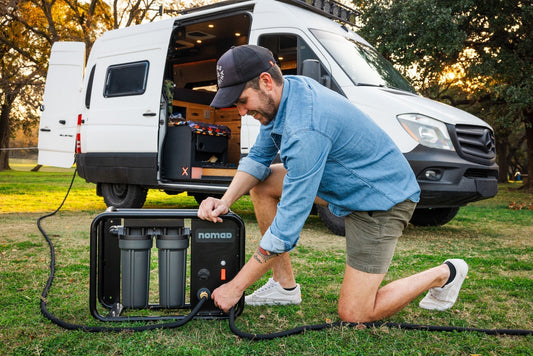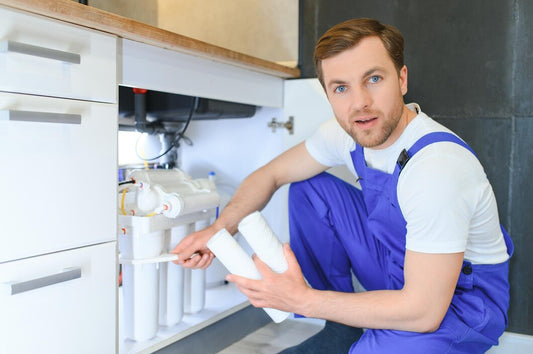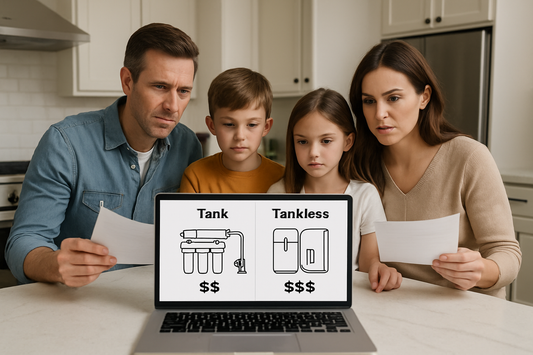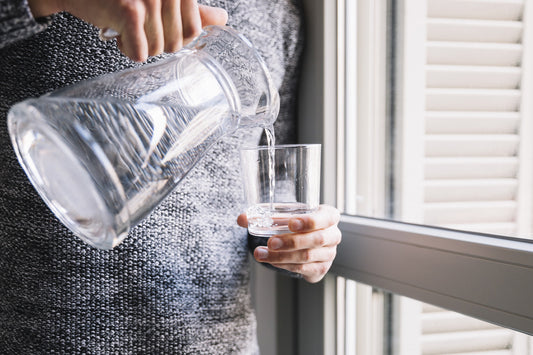You turn on your kitchen faucet expecting clean, refreshing water, but instead you're greeted with an odd taste, strange smell, or cloudy appearance. Sound familiar? You're not alone—millions of American homeowners face water quality issues that range from annoying to potentially harmful. The good news? Modern water home filtration systems can solve virtually any water problem you're experiencing.
But here's where it gets confusing: walk into any home improvement store and you'll face dozens of options, conflicting claims, and price tags that range from $50 to $5,000+. How do you know which system actually addresses your specific water issues without overpaying for features you don't need?
Understanding Your Water Problems First
Before diving into solutions, let's identify the most common water quality issues plaguing American homes—and the telltale signs you're likely noticing.
Hard Water Problems Does your soap barely lather? Are your dishes spotty despite running through the dishwasher? Hard water affects 85% of US homes, leaving mineral deposits that damage appliances and make cleaning a nightmare.
Chlorine and Chemical Taste That pool-like smell and taste comes from municipal chlorine treatment. While it kills bacteria during transport, it can create unpleasant drinking experiences and potentially harmful byproducts.
Sediment and Cloudiness If your water looks murky or leaves gritty residue, you're dealing with sediment from aging pipes or well water contamination. This isn't just aesthetic—particles can harbor bacteria and damage your plumbing.
Heavy Metal Contamination Lead, mercury, and other heavy metals can leach from old pipes or contaminated groundwater. These invisible threats pose serious health risks, especially for children and pregnant women.
Water Filter vs Water Purifier: What's the Real Difference?
Here's where most homeowners get lost in the technical jargon. Let's break this down simply:
Water Filters remove specific contaminants through physical barriers, carbon absorption, or chemical processes. They're excellent for improving taste, odor, and removing common pollutants like chlorine and sediment. Think of them as targeted problem-solvers.
Water Purifiers go nuclear on contamination—they eliminate virtually everything, including bacteria, viruses, and dissolved solids. These systems use advanced technologies like reverse osmosis or UV sterilization to create ultra-pure water.
The key question isn't which is "better"—it's which matches your specific water problems and budget.

Image by hryshchyshen
How Much Are Home Water Filtration Systems? Breaking Down Real Costs
Let's get straight to the numbers you're wondering about. How much are home water filtration systems, really?
Point-of-Use Systems (Under Sink/Countertop): $150-$800
- Basic carbon filters: $150-$300
- Multi-stage under-sink systems: $300-$500
- Premium reverse osmosis systems: $400-$800
- Annual filter replacement: $50-$150
Whole House Systems: $800-$4,000
- Sediment and carbon filtration: $800-$1,500
- Water softening systems: $1,200-$2,500
- Comprehensive multi-stage systems: $2,000-$4,000
- Annual maintenance: $100-$300
Professional Installation Costs: $200-$800 Most homeowners spend between $300-$600 total for professional installation, depending on system complexity and plumbing modifications needed.
Matching Filtration Technology to Your Water Problems
For Hard Water and Scale Issues Ion exchange water softeners are your best bet. These systems swap calcium and magnesium ions for sodium, preventing mineral buildup. Expect to spend $1,200-$2,500 for a quality whole-house softening system.
For Chlorine Taste and Odor Activated carbon filters excel at removing chlorine and improving taste. A simple under-sink carbon filter ($200-$400) can dramatically improve your drinking water quality within days of installation.
For Heavy Metals and Chemical Contamination Reverse osmosis systems provide the most comprehensive removal of dissolved contaminants. While more expensive ($400-$800 for under-sink units), they're essential if testing reveals heavy metals or chemical contamination.
For Bacterial and Viral Concerns UV sterilization systems destroy 99.9% of harmful microorganisms without adding chemicals. These work best as part of a multi-stage system, typically adding $300-$600 to your total investment.
Modern Water Home Filtration Systems Worth Considering
Gone are the days of basic pitcher filters being your only option. Today's water home filtration systems offer sophisticated solutions for every budget and water problem.
Smart Monitoring Technology Premium systems now include real-time water quality monitoring, filter life indicators, and smartphone connectivity. While these features add $100-$300 to system costs, they eliminate guesswork about maintenance timing.
Space-Saving Designs Modern under-sink systems like tankless reverse osmosis units provide powerful filtration without monopolizing cabinet space. These compact designs fit homes where traditional tank-based systems won't work.
Multi-Stage Filtration Advanced systems combine multiple technologies—sediment removal, carbon filtration, and reverse osmosis—in streamlined designs. This approach ensures comprehensive water treatment while maintaining reasonable costs.

Installation Considerations That Impact Your Investment
DIY vs Professional Installation Simple under-sink filters often feature quick-connect fittings for easy self-installation. However, whole-house systems or complex reverse osmosis units typically require professional installation to ensure proper operation and maintain warranties.
Plumbing Modifications Older homes may need additional plumbing work, adding $200-$500 to installation costs. Factor this into your budget, especially for whole-house systems requiring main water line connections.
Electrical Requirements UV sterilization systems and smart monitoring features need electrical connections. Most installations require standard 110V outlets, but confirm electrical access before purchasing.
Maintenance: The Hidden Cost of Clean Water
Every water filtration system requires ongoing maintenance—factor these costs into your decision:
Filter Replacement Schedules
- Sediment filters: Every 3-6 months ($20-$40)
- Carbon filters: Every 6-12 months ($30-$60)
- RO membranes: Every 2-3 years ($60-$100)
- UV bulbs: Annually ($80-$120)
Professional Service Complex systems benefit from annual professional service ($100-$200), ensuring optimal performance and extending system life.
Making Your Final Decision
Start with water testing to identify your specific contamination issues. Many local water utilities provide free basic testing, or you can purchase comprehensive test kits for $25-$50.
Consider your household size and water usage patterns. A family of four typically uses 300+ gallons daily—ensure your chosen system can handle peak demand without pressure drops.
Think long-term costs, not just upfront investment. A $400 system with expensive filter replacements may cost more over five years than an $800 system with affordable maintenance.

Image by wertinio
Frequently Asked Questions
How often should I replace water filter cartridges?
Most cartridges need replacement every 3-12 months depending on usage and water quality. Systems with monitoring technology will alert you when replacement is due, eliminating guesswork.
Can I install a water filtration system myself?
Simple under-sink systems with quick-connect fittings are DIY-friendly for most homeowners. Complex systems or those requiring plumbing modifications should be professionally installed to ensure proper operation.
Do water filtration systems remove beneficial minerals?
Carbon-based filters preserve healthy minerals while removing contaminants. Reverse osmosis systems remove everything, including minerals—some models include remineralization stages to restore beneficial elements.
How do I know if my water needs filtration?
Common signs include unusual taste/odor, visible particles, soap scum buildup, or staining on fixtures. Professional water testing provides definitive answers about specific contamination issues.
What's the lifespan of a water filtration system?
Quality systems last 10-15 years with proper maintenance. Filter cartridges require regular replacement, but the main system components are built for long-term use.





